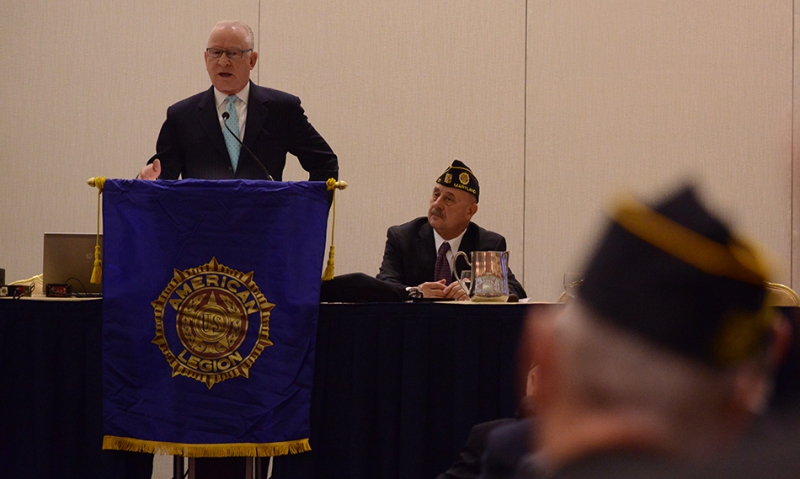
Chairman of the House Armed Services Committee tells Legion that a smaller U.S. military will have a worldwide effect.
Reducing the U.S. military budget isn’t just a national issue as far as U.S. Rep. Howard “Buck” McKeon is concerned. It’s a world issue.
Speaking to The American Legion’s Washington Conference in the nation’s capital March 24, McKeon said a reduced national defense budget will have long-reaching effects across the globe.
“We see (Russia) going in and taking Crimea,” he said. “We see the problems in the whole Middle East. We see the problems of China pushing further and further out, making it very difficult for us to carry out commitments we’ve had around this world for a very, very long time. It would be very difficult now to protect Taiwan, very difficult to defend Israel, very difficult to protect these very important agreements that we’ve made over the years to friends and allies around the world.”
McKeon, chairman of the House Armed Services Committee, said U.S. allies have come to him with their worries about the U.S.’s military capability. “I meet with international leaders almost daily – people from other countries, defense ministers, legislators, prime ministers, kings,” he said. “They ask me, ‘Where is America? Are you going to be there when we need you?’ They see us pulling back. They see for five years we’ve talked about this shift to the Pacific. They’re concerned.”
Reducing the military at the end of wars is a tradition, McKeon said. But he said the current reduction is intertwined with a shifting strategy that has left him confused.
“Over our history, after every war, we’ve (reduced) our military,” he said. “After World War II we did it. After Korea we did it. After Vietnam we did it. Some of you probably served at a time when the military was pretty hollow. You know how detrimental that is.
“So when we get called on to do something, you understand how the military works: They salute and do the best they can. But we’ve had a very defined strategy since World War II: to be able to fight two major contingencies at the same time. Over the last couple of years we’ve done away with that strategy. I cannot really tell you right now what our strategy is. I’ve asked and I’ve had it explained to me, but I can’t explain it. Now it’s kind of ‘do the best we can with whatever budget we’re given.’”
McKeon asked Legionnaires to help him in spreading the word to those unaware of how sequestration and other defense budget cuts can negatively impact the U.S. and its allies.
“What I’m asking you to do is tell your friends, your neighbors – those who haven’t worn the uniform or those who have – explain to them how serious this situation is,” he said. “We cannot solve our national financial problems on the backs of the military."
McKeon, who has served in Congress since 1992, will retire after his term ends. “I’m leaving Congress, but I’m not leaving the fight,” he said.
- Washington Conference

